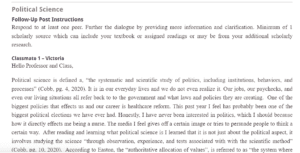Why Political Science
Responding to Victoria
Hello Victoria,
Thank you for sharing your post. I, too, had a distaste for politics and, more so, during the campaign period. It reached a point where I would switch off any and every media outlet. I went to vote and afterward simply waited for the results. I must admit I couldn’t stand the drama and all the mudslinging and politicking. I can honestly say that the campaign period made me loathe politics to the core. However, after looking through the semester’s topics in political science, I guess my opinion will be changed; our opinions in the next eight weeks will be changed. Because political science is a discipline that utilizes diverse approaches, I am guessing this course will train us in several critical skills that will help us succeed in almost any career we pursue. The assignments will also develop our writing skills, which I think will come in handy. Hire our assignment writing services in case your assignment is devastating you.
Responding to Sheila
Hello Sheila,
Thank you for sharing your post. You have mentioned that political science concentrates on “advancing the interested concentrates on the advancement of interested citizens and accountable leaders who can have a constructive influence in their communities at all stages” (Perruci, 2020). Unsurprisingly, alumni of political science majors are found succeeding in diverse organizations and professions, including business and law; they are also leaders in many Fortune 500 companies. Some of the alumni also find government offices fascinating to the point they make careers out of the same. While many professions, for example, law, call for one to attend a professional school for a post-graduate degree, the intellectual skills that a person attains from political science form a good foundation for success. In reference to nursing, attaining skills in political science will help us be better advocates for our field in the political realm.
Reference
Perruci, G. (2020). Political science: Developing Effective participants in the democratic process. New Directions for Student Leadership, 2020(165), 49–59. https://doi.org/10.1002/yd.20368
ORDER A PLAGIARISM-FREE PAPER HERE
We’ll write everything from scratch
Question
Political Science
Follow-Up Post Instructions
Respond to at least one peer. Further the dialogue by providing more information and clarification. Minimum of 1 scholarly source which can include your textbook or assigned readings or may be from your additional scholarly research.

Why Political Science
Classmate 1 – Victoria
Hello Professor and Class,
Political science is defined a, “the systematic and scientific study of politics, including institutions, behaviors, and processes” (Cobb, pg. 4, 2020). It is in our everyday lives and we do not even realize it. Our jobs, our paychecks, and even our living situations all refer back to to the government and what laws and policies they are creating. One of the biggest policies that effects us and our career is healthcare reform. This past year I feel has probably been one of the biggest political elections we have ever had. Honestly, I have never been interested in politics, which I should because how it directly effects me being a nurse. The media I feel gives off a certain image or tries to persuade people to think a certain way. After reading and learning what political science is I learned that it is not just about the political aspect, it involves studying the science “through observation, experience, and tests associated with with the scientific method” (Cobb, pg. 10, 2020). According to Easton, the “authoritative allocation of values”, is referred to as “the system where one group or another gets to determine how society will operate and can compel adherence to their set of preferred values through laws” (Easton, 1965). Political science is a system, a framework, or like an assembly line in a factory. All the pieces fit together like a puzzle and I am excited to learn all about it the next 8 weeks.
References
Cobb, W. W. N. (2019). Political Science Today (1st ed.)
Easton D. (1965). A Systems Analysis of Political Life. New York : Wiley.
Classmate 2 – Sheila
Political science is the methodical and scientific study of politics, including institutions, actions, and procedures. Political science is rather detached from the everyday bedlam that is often seen in the media (Cobb, p. 3, 2020). Key concepts and perceptions of political science include different parts of government, civil rights, leadership, political culture, ideology, and civil liberties (Cobb, p. 12, 2020). Democratic governance has been a main principle of leadership growth in U.S. political science departments. The discipline concentrates on the advancement of interested citizens and accountable leaders who can have a constructive influence in their communities at all stages (Perruci, 2020).
“Even if a political science department does not offer a distinct leadership program, it still tends to use leadership as an underlying theme in its recruitment of students (Perruci, 2020).”Occasionally students majoring in political science often have specific career paths in mind such as lawyer, policy‐making, administration, and advocacy for organizations outside of the government. Outside of leadership there is a focus in providing contributors in the democratic process with education in policy issues and institutional traditions that allow citizens to become more effective participants (Perruci, 2020).
My hope will be that in the next 8 weeks I gain more knowledge of political science and how it affects my leadership skills.
References
Cobb, W. W. N. (2019). Political Science Today (1st ed.). CQ Press. [VitalSource Bookshelf]. Retrieved from https://ambassadored.vitalsource.com/#/books/9781544358314/cfi/6/10!/4/2/6/2/6@0:46.6
Perruci, G. (2020). Political science: Developing Effective participants in the democratic process. New Directions for Student Leadership, 2020(165), 49–59. https://doi.org/10.1002/yd.20368

